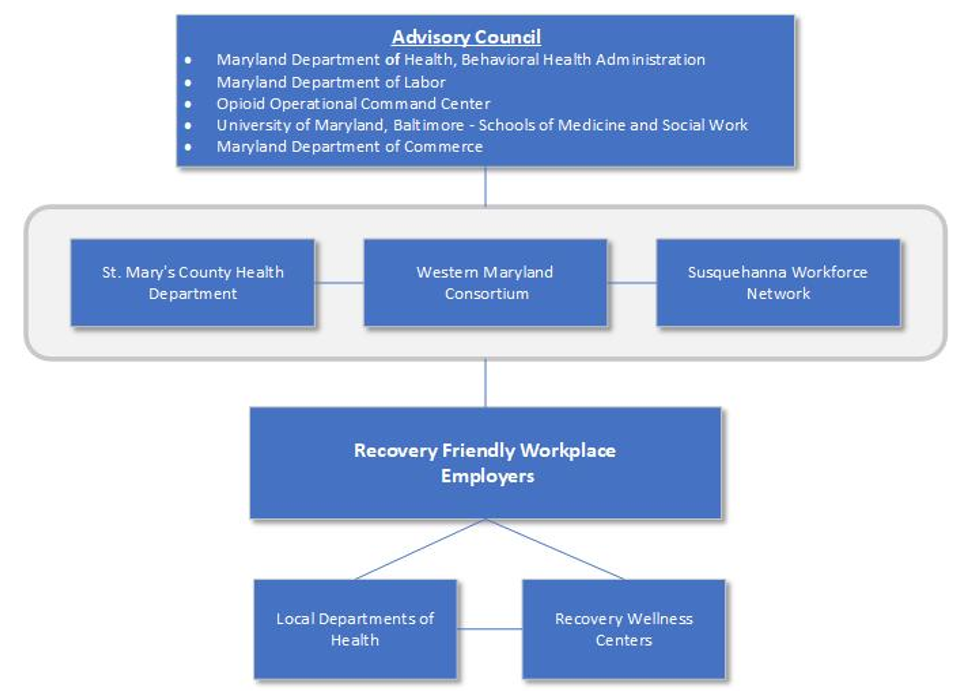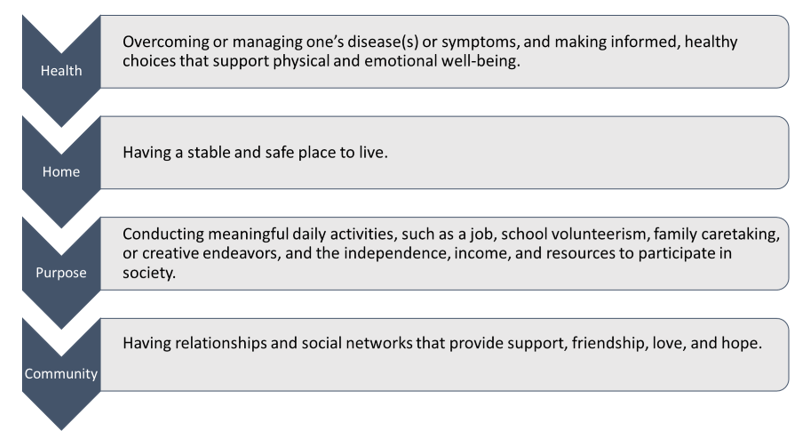What is a Recovery Friendly Workplace - Workforce Development and Adult Learning
“In a Recovery-friendly workplace, I hope that coworkers are educated on the disease aspect of addiction. I don’t want either party to feel like they’re walking on eggshells around one another. Being treated like a part of something has allowed me to expand my goals… It is my wish that every workplace was like this. Kindness, compassion, and support are key to any recovery-friendly workplace.”
– a Frederick County Employee in Recovery
The Recovery Friendly Workplace (RFW) model is a framework for employers to support employees and communities around the experience of addiction. The framework recognizes recovery from substance use disorder as a strength and Employers that participate as RFWs intentionally engage and hire people in recovery, foster healthy and safe working environments, and encourage collaboration among employees and community members to create positive change and eliminate barriers for those impacted by substance use.
Maryland’s RFW Model
 The Maryland Department of Labor’s (MD Labor) RFW pilot is based on national models but is tailored to meet the needs of our state. The project is inclusive of four levels of stakeholders:
The Maryland Department of Labor’s (MD Labor) RFW pilot is based on national models but is tailored to meet the needs of our state. The project is inclusive of four levels of stakeholders: -
An Advisory Council, which oversees the project. The Advisory Council includes:
- The Maryland Department of Health’s Behavioral Health Administration,
- Maryland Department of Labor,
- the Opioid Operational Command Center,
- The Maryland Department of Commerce; and,
- representatives from The University of Maryland Schools of Medicine and Social Work;
- The subawardees:
- Western Maryland Consortium,
- Susquehanna Workforce Network; and,
- St. Mary’s County Department of Health.
- Employers participating in the RFW model
- Entities supporting RFW employers, including, but not limited to:
- Local Departments of Health; and
- Recovery Wellness Centers.
How do employers benefit from becoming Recovery Friendly Workplaces?
The United States Department of Labor recognizes that by adopting RFW policies and practices, businesses can help reduce costs associated with turnover, loss of productivity, health service utilization, and injury or accident risk due to substance-related impairment. As an example, workers who are in recovery have the fewest days of unscheduled leave of any group, including their peers with no SUD (8.3 days compared to 10.5 days, respectively).
Maryland has a strong recovery community and employers who commit to becoming RFWs will be able to leverage their engagement in the model to open doors to prospective employees while also serving as a model for good corporate citizenship. People in recovery are often self-aware, resilient, compassionate, dedicated, and understanding and RFWs will have the benefit of exposure among a pool of qualified and loyal candidates.
Of note are the more than 13.6 million workers who are already impacted by a substance use disorder. There is a strong chance you are currently employing someone who may be struggling with addiction. Implementing practices from the RFW model can assist your business with providing resources employees need to address their substance use and improve your ability to retain staff.
To learn more about the real cost of substance use to your business, the National Safety Council has created an easy-to-use cost calculator that will deliver immediate data about the impact to your bottom line based on the size of your employee base, industry, and state:
National Safety Council’s Employer Substance Use Cost CalculatorHow do jobseekers benefit from Recovery Friendly Workplaces?
The Substance Abuse and Mental Health Services Administration (SAMHSA)has identified four major dimensions of recovery that are integral to sustaining recovery long-term.
SAMHSA’s Four Dimensions of Recovery

Although being employed can have an impact on all four dimensions, participation in the workforce most clearly provides a sense of purpose and access to community for many people. Individuals who seek employment at a business that has adopted Recovery Friendly Workplace policies or practices know that they are entering a workspace that has educated their staff about substance use and provided anti-stigma programming. They know that the employer has connected with their local Recovery Friendly Advisor, who can serve as a source of support and a resource to employees who may need assistance with their own substance use and/or recovery or that of a loved one.
